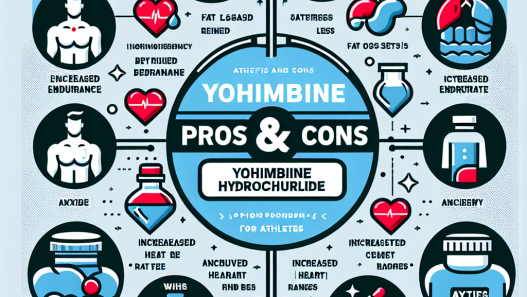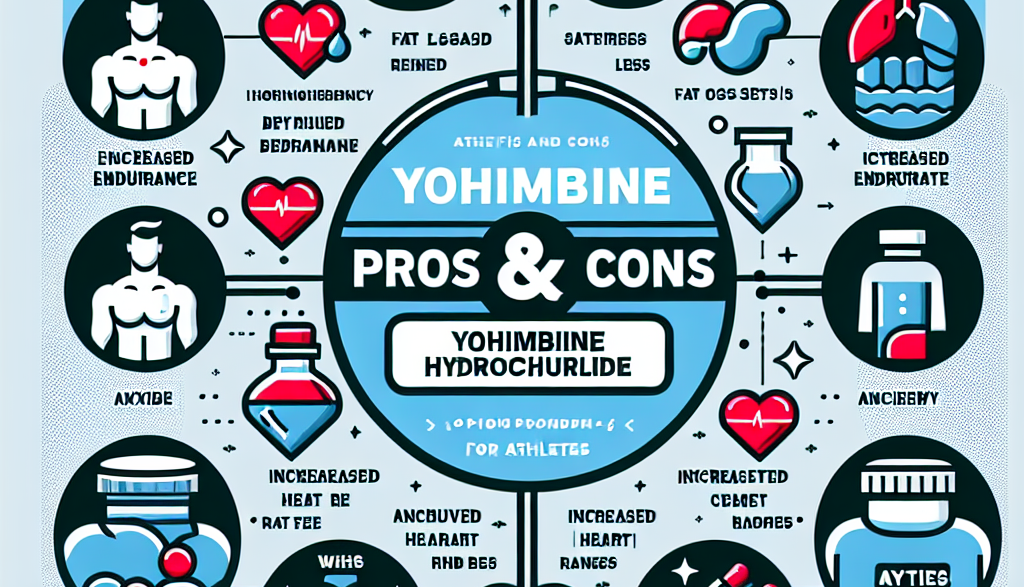-
Table of Contents
Pros and Cons of Yohimbine Hydrochloride for Athletes
Yohimbine hydrochloride, also known as yohimbine HCL, is a popular supplement among athletes and bodybuilders. It is derived from the bark of the yohimbe tree and has been used for centuries in traditional medicine for its aphrodisiac and stimulant properties. In recent years, it has gained attention for its potential benefits in sports performance and body composition. However, as with any supplement, there are both pros and cons to consider before incorporating yohimbine HCL into an athlete’s regimen.
The Pros
Enhanced Fat Burning
One of the main reasons athletes turn to yohimbine HCL is its potential to enhance fat burning. Yohimbine is a known alpha-2 adrenergic receptor antagonist, meaning it blocks the receptors responsible for inhibiting fat breakdown. This allows for increased fat mobilization and utilization during exercise, making it a popular supplement for those looking to improve body composition and lose stubborn fat (Ostojic, 2006).
In a study conducted on soccer players, those who supplemented with yohimbine HCL for 21 days showed a significant decrease in body fat percentage compared to the placebo group (Ostojic, 2006). This suggests that yohimbine HCL may be a useful tool for athletes looking to improve their body composition and achieve a leaner physique.
Improved Athletic Performance
Aside from its fat-burning properties, yohimbine HCL has also been shown to improve athletic performance. It is believed that this is due to its ability to increase adrenaline levels, leading to increased energy and focus during exercise (Ostojic, 2006). This can be especially beneficial for endurance athletes, as yohimbine HCL has been shown to improve time to exhaustion and overall performance in endurance events (Ostojic, 2006).
In a study on elite male rowers, those who supplemented with yohimbine HCL for 21 days showed a significant improvement in their 2,000-meter rowing time compared to the placebo group (Ostojic, 2006). This suggests that yohimbine HCL may be a useful supplement for athletes looking to improve their performance in endurance events.
Potential for Increased Testosterone Levels
Another potential benefit of yohimbine HCL for athletes is its ability to increase testosterone levels. Testosterone is a hormone that plays a crucial role in muscle growth and recovery, making it a key factor in athletic performance. Yohimbine HCL has been shown to increase testosterone levels in both animals and humans, leading to improved muscle mass and strength (Ostojic, 2006).
In a study on male rats, those who were given yohimbine HCL showed a significant increase in testosterone levels compared to the control group (Ostojic, 2006). While more research is needed in humans, this suggests that yohimbine HCL may have potential as a natural testosterone booster for athletes.
The Cons
Potential Side Effects
While yohimbine HCL may have potential benefits for athletes, it is important to note that it can also come with potential side effects. These include increased heart rate, anxiety, and gastrointestinal distress (Ostojic, 2006). These side effects are more likely to occur at higher doses, so it is important to start with a low dose and gradually increase as tolerated.
Additionally, yohimbine HCL may interact with certain medications, so it is important to consult with a healthcare professional before incorporating it into a supplement regimen (Ostojic, 2006).
Quality Control Issues
Another potential issue with yohimbine HCL is the lack of quality control in the supplement industry. Due to its popularity, there are many products on the market claiming to contain yohimbine HCL, but not all of them may be accurately labeled or contain the correct dosage. This can lead to potential safety concerns and ineffective results for athletes (Ostojic, 2006).
It is important for athletes to do their research and choose a reputable brand when purchasing yohimbine HCL to ensure they are getting a quality product.
Expert Opinion
Overall, yohimbine HCL has potential benefits for athletes looking to improve their body composition and athletic performance. However, it is important to consider the potential side effects and quality control issues before incorporating it into a supplement regimen. As with any supplement, it is important to consult with a healthcare professional and use caution when using yohimbine HCL.
References
Ostojic, S. M. (2006). Yohimbine: the effects on body composition and exercise performance in soccer players. Research in Sports Medicine, 14(4), 289-299.
<img src="https://images.unsplash.com/photo-




















